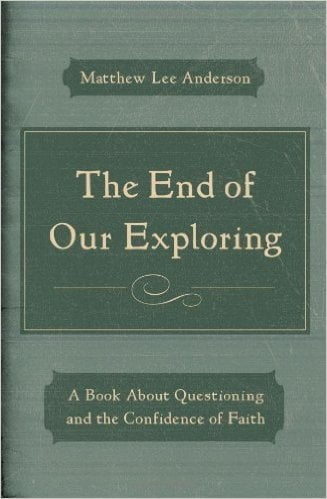⏱️ Estimated Reading Time: 4 min read
What does it meant to ask good questions? In part it means to listen for answers. It has become exceedingly popular in recent years to celebrate doubt. There is, of course, a place for doubt, and I have written on its place in the Christian life. Yet, doubt often means little more than excusing obedience and belief. Doubt, in much popular Christian conversation, is not interested in finding answers, in waiting on God, and in exploring our faith deeper. It becomes a reason for staying put. Matthew Lee Anderson, however, helps readers to understand how to ask good questions even while they continue to express confidence in their faith. The End of Our Exploring is a fantastic resource for thinking critically about the uncertainty of our knowledge and the certainty of our faith.
“I am chiefly concerned to explore whether we can question well and what such questioning might look like,” writes Anderson. Questioning is a part of life, it is a natural outworking of love, desire, and interest. Yet, not all questions are created equal. It’s important to know the difference, argues Anderson. So, his book helps to direct us towards healthy questioning. He does this by considering a number of related factors. We explore the reality that no question is neutral, and so are forced to consider our own biases. We wrestle with the relationship between doubt and questions, they are not the same thing. We explore what it means to look for answers to our questions, the relationship of our questions to the world around us, and the role of community in helping us to think through questions. The breadth of the content is impressive for its size (214 pages, counting appendices).
Anderson is definitely a philosopher. His writing is beautiful and invites reflection, yet it is deep. Asking questions about the nature of asking questions is itself a deep philosophical pursuit, but it is worth the energy. Anderson makes some incredibly insightful comments throughout this work. I don’t know if I have ever read anything else like this book. It compares certainly to other works on doubt and yet stands above them all. It is more a book on the method of healthy doubt or on stewarding doubt for our own good. While other books offer up critiques of the church for their failure to allow room for doubt, or they describe the experience of doubt itself, The End of Our Exploring is more focused on the big picture. It leads us in considering more distinctly on how to ask good questions of our faith. It does so especially with an eye towards humility and confidence in the God of our faith and His written word. In that regard there’s much to love about this book.
The book directs readers, again and again, to see how our “exploring” leads us ultimately to Christ. Rather than leading us away, our questioning drives us towards the One who has the answers. Readers will not find this book the sort that has a condescending tone that holds the Scriptures or Orthodox faith with contempt. Neither, however, will they find the sort of simplistic cliches that state “Jesus is the answer.” He is the answer, but there is much more to such a profound statement than its trite expression. Anderson interacts well with the Scriptures and makes a compelling case for both wrestling well with our questions, and for bringing them to Jesus.
This is a unique and worthwhile read. I highly commend The End of Our Exploring as both a well-written work, and a provocative one. It will help you to develop better questioning skills, without losing any sense of our dependency upon and faith in the Scriptures and the God of the Scriptures.



